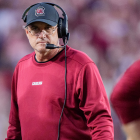Notre Dame AD Pete Bevacqua says College Football Playoff should expand to 16 teams: 'Prove it on the field'
Bevacqua says playoff expansion will help identify a true national champion

It's only the second year of the 12-team College Football Playoff era, but discussion about the future format of the postseason -- particularly adding more teams to the field -- has been a major storyline in the sport
Notre Dame athletic director Pete Bevacqua is among those who believe expanding the playoff field is the right move, even after the Fighting Irish made the national championship game in the first season with a 12-team field. Speaking Friday on the "Dan Patrick Show," Bevacqua was strong in his endorsement of a 16-team playoff with five automatic qualifiers and 11 at-large entrants rather than various proposals that would guarantee a number of spots for the Big Ten and SEC.
"100% answer in my opinion," Bevacqua said of expansion. "16 teams is the way we should go. Five automatic qualifiers, one each for the Power Four conference champions, one for the highest G5 champion, 11 at large, prove it on the field. If we're lucky enough to be in, we're in. If, because we happen to be independent, we have three losses or four losses and we're out, we're out. I think there's almost unanimity in that feeling. I hope that's where we end up. I feel passionate about that. I think it's the best thing for college football and the best thing for the future of college football."
"100% answer in my opinion, 16 teams is the way we should go."
— Dan Patrick Show (@dpshow) October 17, 2025
– Notre Dame AD Pete Bevacqua is in favor of a 16-team College Football Playoff format. pic.twitter.com/HarzFBlKzv
Bevacqua, a member of the CFP Management Committee alongside the 10 FBS conference commissioners, also advocated for a 16-team field over the summer and made it clear at the time that he opposed the idea of four automatic qualifiers for the Big Ten and SEC.
Bevacqua saying there's unanimity in the idea of adding four more teams to the playoff appears to be a change from September, when the CFP management committee only briefly discussed expansion. At the time, CFP executive director Rich Clark said, "My sense is the room's comfortable with (staying at 12) if that's where we go, and that's probably why they're not too pressed with rushing to a decision."
CFP leaders must decide on a format for the 2026 playoff by Dec. 1, a deadline set by television partner ESPN.

On Friday, Bevacqua pointed to the makeup of the current AP rankings as proof that the sport has shifted in a more competitive direction and that giving more opportunities to make the playoff would reward teams for good play and a strong schedule, ultimately doing even better to identify a "true" national champion.
"Look at the top 10 this year, look at the different teams in there," Bevacqua said. "Look at the success Texas Tech is having. You want that. You want every team to wake up at the end of summer and as they go into their first game and say, 'Hey, if we get it done and go 12-0 or go 11-1, if we schedule tough opponents and have a strong strength of schedule, we can earn our way in there.' Nobody wants a head start; that's not the way to do it. We want to prove that we can identify a true national champion and a team that earned it on the field. I feel very strongly about that."
The 2024 season marked the move from a four-team playoff field. Bevacqua saw Notre Dame suffer an early-season disaster with a home loss to Northern Illinois. But Notre Dame rallied from there and finished the regular season 11-1 before being slotted into the playoff as the No. 7 seed. The Irish battled to the National Championship Game, where they lost to Ohio State.
Bevacqua identified the importance of the regular season schedule as even more reason to expand the playoff field, even pointing at Notre Dame's Week 7 game with USC, which will likely eliminate the loser from consideration for this year's playoff.
"I think the move from four to 12 was terrific and smart," Bevacqua said. "I think the move from 12 to 16 brings additional teams in, obviously. It creates those four additional narratives around the country. It brings those fanbases in and brings in other geographies. Yet, there's that delicate balance it achieves and maintains of identifying a true national championship, but protecting the integrity and importance of the regular season.
"There's no sport where the regular-season games are more important than they are in college football. Here we are in Week 7 and we have a game tomorrow night that, for us, will determine if we can make the playoffs or if we're on the outside looking in. That doesn't happen in other sports. That's the beauty of college football and why there's so much passion around these games."

















